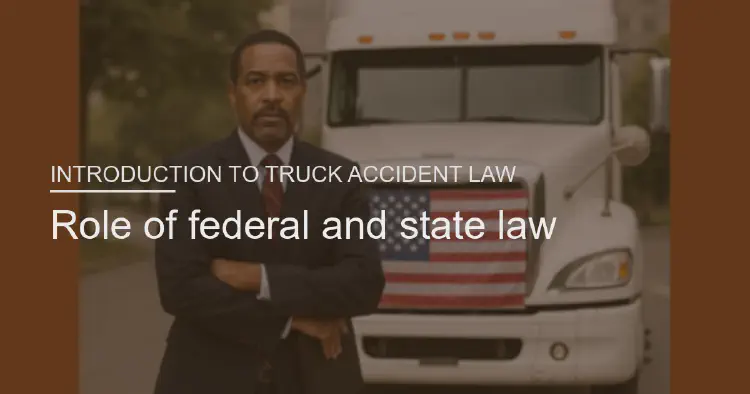Role of federal and state law
Truck accident cases in the United States operate within a dual legal framework shaped by both federal and state laws. Understanding how these layers interact is essential for determining liability and compliance.
- Truck Accident Law Team
- 2 min read
Article 3 of 5 in Introduction to Truck Accident Law/

Role of Federal and State Law in Truck Accidents
Federal Law
- Primary Authority: The Federal Motor Carrier Safety Administration (FMCSA), under the U.S. Department of Transportation (DOT), issues regulations governing commercial trucking nationwide.
- Key Areas of Oversight:
- Hours of Service (HOS) rules that limit driver working hours to reduce fatigue.
- Vehicle maintenance and inspections to ensure roadworthiness.
- Drug and alcohol testing for commercial drivers.
- Commercial Driver’s License (CDL) standards that ensure driver competence.
- Preemption Principle: Federal rules often override conflicting state regulations, especially where interstate commerce is involved.
State Law
- Traffic Laws: Each state enforces its own traffic rules, speed limits, and road safety statutes.
- Insurance Requirements: States dictate minimum liability coverage beyond federal minimums, particularly for intrastate trucking.
- Negligence Standards: States differ in applying comparative negligence vs. contributory negligence when determining fault.
- Court Procedures: Deadlines for filing lawsuits (statutes of limitations) and procedural rules vary by jurisdiction.
Interaction Between Federal and State Law
- Interstate vs. Intrastate Commerce: Federal law dominates when trucks cross state lines, while state law controls when trucking occurs solely within a state.
- Concurrent Application: Often, both sets of laws apply simultaneously. For example, a fatigued driver may violate federal HOS rules and state reckless driving laws.
- Litigation Impact: Lawyers must navigate both legal systems to identify violations, establish liability, and maximize recovery for victims.
Summary: Federal law sets the baseline safety standards for trucking across the U.S., while state law governs local traffic rules, liability standards, and court procedures. Successful truck accident litigation requires harmonizing both legal frameworks to build a strong case.
You might also like:
- Tags:
- Truck Accidents
- Hours Service
- Accident Litigation
- Comparative Negligence
- Drug Alcohol
- Federal Law
- Federal State
- Service Hos
- Safety Standards
- Contributory Negligence
- Alcohol Testing
- Liability Coverage
- State Law
- Hos Rules
- Safety Administration
- Speed Limits
- Insurance Requirements
- State Regulations
- Traffic Laws
- Commercial Driver
- Commercial Drivers
- Department Transportation
- Administration Fmcsa
- Carrier Safety
- Federal Motor
- Motor Carrier
- Interstate Commerce
- Reckless Driving
- Cdl Standards
- Minimum Liability
- Driver License
- License Cdl
- Court Procedures
- Transportation Dot
- Commercial Trucking
- Establish Liability
- Deadlines Filing
- Standards States
- Road Safety
- Law Truck
- Statutes Limitations
- Truck Accident Litigation
- Hours Service Hos
- Drug Alcohol Testing
- Commercial Driver License
- Driver License Cdl
- Carrier Safety Administration
- Federal Motor Carrier
- Motor Carrier Safety
- Safety Administration Fmcsa
- Minimum Liability Coverage
- Department Transportation Dot
- Insurance Requirements States
- License Cdl Standards
- Service Hos Rules
- Vs Contributory Negligence
- Accident Litigation Requires
- Role Federal State
- Comparative Negligence Vs
- Negligence vs Contributory
- Truck Accidents Federal
- Authority Federal Motor
- Standards States Differ